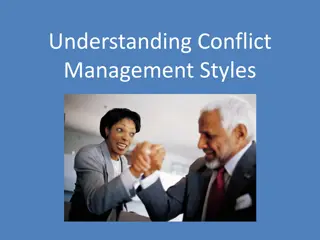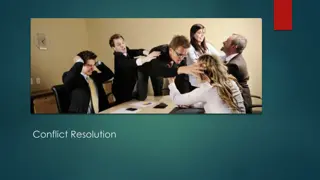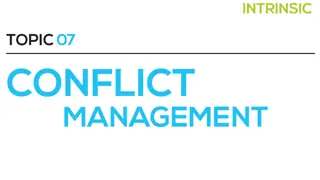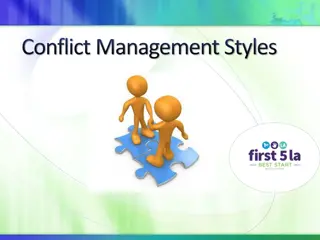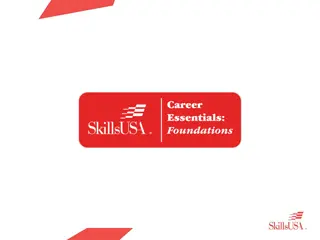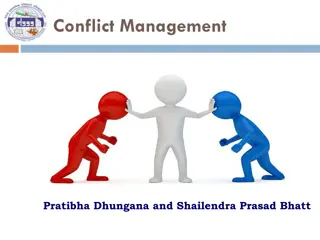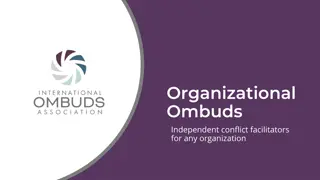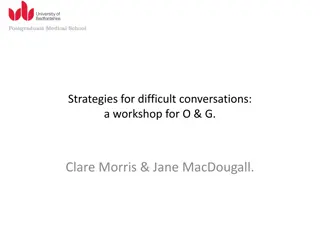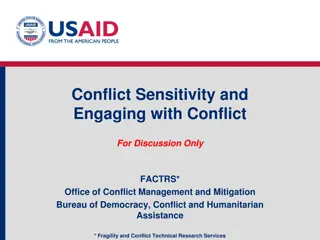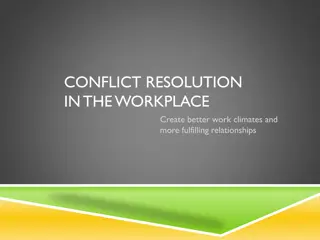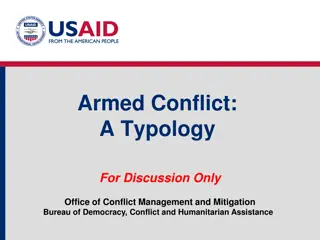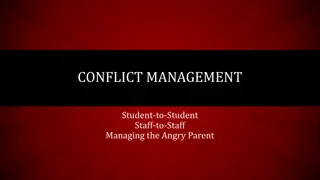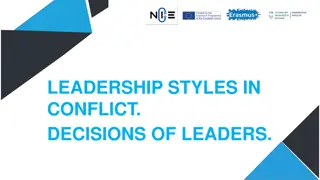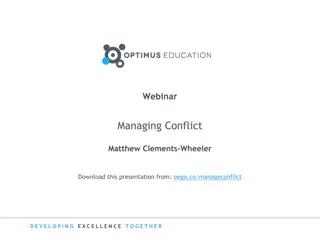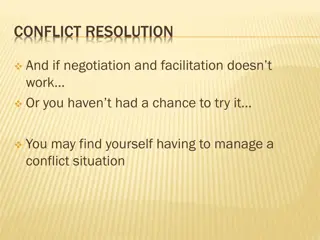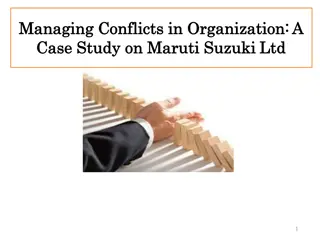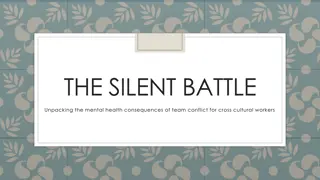Effective Conflict Management Strategies for Facilitators
Strategies for dealing with confrontation and conflict scenarios during facilitation sessions, including addressing reluctant participants, navigating group conflicts, handling challenging individuals, and managing dominant figures or elements. Tips encompass setting expectations, promoting inclusivity, mediating conflicts, fostering communication, and achieving workshop objectives.
- Conflict management
- Facilitation techniques
- Group dynamics
- Communication skills
- Leadership development
Download Presentation

Please find below an Image/Link to download the presentation.
The content on the website is provided AS IS for your information and personal use only. It may not be sold, licensed, or shared on other websites without obtaining consent from the author. Download presentation by click this link. If you encounter any issues during the download, it is possible that the publisher has removed the file from their server.
E N D
Presentation Transcript
Examples of confrontation or conflict 1. A reluctant and hostile participant Someone who actively resists being part of the group or activity, expressing disinterest or even opposition Scenario: The facilitator notices that Emily, a participant in a leadership workshop, openly expresses disinterest and resistance. The challenge is for the facilitator to create an inclusive and engaging environment, encouraging Emily's active participation despite initial reluctance. 2. Conflict between or within a group Involves tension, disagreement, or discord among members, hindering collaboration and progress Scenario: In a team-building workshop led by the facilitator, tensions arise among team members regarding the best approach for a collaborative project. The facilitator faces the challenge of mediating the conflict, fostering effective communication, and guiding the group toward a consensus that aligns with the workshop objectives. 3. Description: A challenge to the facilitator Involves a participant questioning or challenging the authority, effectiveness, or approach of the person leading the group. Scenario: While conducting a communication skills workshop, Jake questions the facilitator's methods and challenges their ability to effectively lead the session. The facilitator must navigate this challenge, maintaining authority and adapting their approach to address Jake's concerns while ensuring the overall success of the workshop. 1. Dominating figures, time, or tasks This refers to situations where one person or element exerts excessive control, potentially overshadowing others' contributions Scenario: During a goal-setting workshop, one participant, Ishmail, consistently dominates discussions, leaving little time for others to contribute. The facilitator must manage Lisa's dominance, ensuring equal participation and effective time management to meet the workshop's objectives.
Ideas for dealing with this conflict before, during and after the session and Ways of articulating the solutions
Before During After Set the tone and lead by example Involve the group in contracting agreed behaviours and the role of facilitator and participants if issues arise (remind people of these agreements if they are broken) Have a process for parking discussions and re-addressing later Involve and offer direct invitation to contribute from quieter participants Acknowledge conflict/challenge/strong feelings Ask people to re-frame contentious questions or statements Use reflective listening to put statements or situation in context Focus on the way forwards- what we all want to achieve from the meeting/session Step in to diffuse tricky situations Monitor and moderate the chat Instigate a pause/quiet moment for all Come back to aims of the session Cater for all in your audience Explore any opposition- be curious and ask questions Validate concerns and make sure people feel heard Use a co-facilitator in a break-out room as a calm space for time out Highlight potential contentious issues Know who is attending Organise break out rooms in advance Clear roles for facilitators/tech support Circulate agreed behaviour codes Arrive early and be prepared Know the tech- how to mute or remove people or disable or change chat settings if needed Connect with participants- share info, invite questions- understand what people want to get from session Make session aims clear Reflect on the session Check in on participants involved in a dispute or who disengaged Have conversations about video or recordings that may contain disagreements and how/if they should be shared Facilitator briefing- make sure we re supporting each other sustainablehealthcare.org.uk @sushealthcare
People obviously feel very strongly on this subject. Shall we take a minute of quiet to re-centre ourselves? And I will remind us of the safe space agreements we all made earlier in the chat Bob, you re written a comment in the chat. Would you feel able to unmute and re-frame your comment into a question as to what would be a possible first step for change? Ishmail, you ve made some really excellent points there- sorry to cut you off but I think Frances might have some insights that would speak to what you ve been saying Jake you ve raised some interesting points. The study you mention sounds useful- do pop a link in the chat to me. Can we park it until after the breakout room so I have a chance to look at the link? I think we all recognise Emily s frustration and agree that with a busy to-do list we want to get the most out of today. Emily let s catch up in the break to chat more about how we can make this worthwhile Frances, you have lots of experience in this area- we d really appreciate your thoughts on what Bob s said sustainablehealthcare.org.uk @sushealthcare



